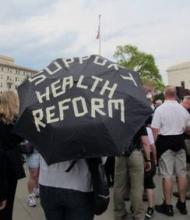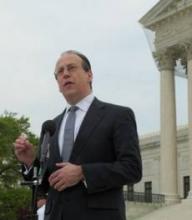WASHINGTON – The Affordable Care Act’s future was thrown further into doubt on March 28 as the Supreme Court concluded its 3 days of oral arguments.
In the morning, a potential majority of the justices seemed to be leaning toward the idea that if they found the so-called individual mandate to be unconstitutional, they might strike down the entire law.
Later in the day, the court heard arguments on whether the law’s Medicaid expansion was unduly coercive to the states. It was not as clear from that discussion whether the court would overturn the expansion or keep it.
In the morning, U.S. Deputy Solicitor General Edwin S. Kneedler argued on behalf of the federal government that even if the court ruled that the individual mandate is unconstitutional, the rest of the ACA should remain law. "This is a huge act with many provisions that are completely unrelated to market reforms and operate in different ways," he said.
He called striking the entire law "extraordinary," and said that millions of people who already have gained health coverage would be "thrown off the insurance rolls."
Instead, the court could parse the law to determine where it best meets congressional intent, Mr. Kneedler argued.
Most of the justices said that that was not realistic.
Striking some parts but not others might "impose a risk on insurance companies that Congress never intended," Justice Anthony Kennedy said. "That, it seems to me, can be argued at least to be a more extreme exercise of judicial power than to strike the whole."
Justices Antonin Scalia and Samuel Alito expressed concerns about overstepping the court’s bounds. In parsing the law, "there is no way that this court’s decision is not going to distort the congressional process," Justice Scalia said.
The challengers – 26 states and the National Federation of Independent Business – argued that if the mandate were ruled unconstitutional, it would gut the law, and thus, the rest would have to be invalidated.
Justice Ruth Bader Ginsburg questioned that assertion. "Why should we say it’s a choice between a wrecking operation – which is what you are requesting – or a salvage job?" she asked. "The more conservative approach would be salvage rather than throwing out everything."
Some of the justices said that not all of the law’s provisions seemed to be related or carefully and thoughtfully included by Congress, as Paul Clement, attorney for the ACA’s challengers, argued.
"A lot of this is reauthorization of appropriations that have been reauthorized for the previous 5 or 10 years, and it was just more convenient for Congress to throw it in the middle of the 2,700 pages than to do it separately," Chief Justice John Roberts said.
In the afternoon, Mr. Clement also represented the 26 states who challenged the ACA’s requirement that states expand Medicaid to residents with incomes equal to or below 133% of the federal poverty line. Under the law, states would have the option to choose what kind of coverage they offered; the federal government would cover 100% of the cost of coverage for the first 2 years, and then 90%-93% of the cost indefinitely.
The challengers said that even though much of the cost would be covered by the federal government, the law provided no way to opt out of the program. As such, the expansion was coercive, Mr. Clement said.
"Why is a big gift from the federal government a matter of coercion?" asked Justice Elena Kagan. "It’s just a boatload of federal money for [the states] to take and spend on poor people’s health care."
Mr. Clement argued that under the law, if the state did not accept the funds for expansion, the U.S. Health and Human Services department could decide to withhold all of the federal Medicaid funds designated for the state.
"Isn’t that true of every Medicaid increase?" Justice Ginsburg asked. Every time Congress has added new Medicaid benefits, "the condition is, if you want the Medicaid program, this is the program; take it or leave it."
Solicitor General Donald B. Verrilli Jr. said that the government has never actually used that authority – that usually, a compromise is reached between the states and the federal government.
But several justices noted that just the threat could amount to coercion.



